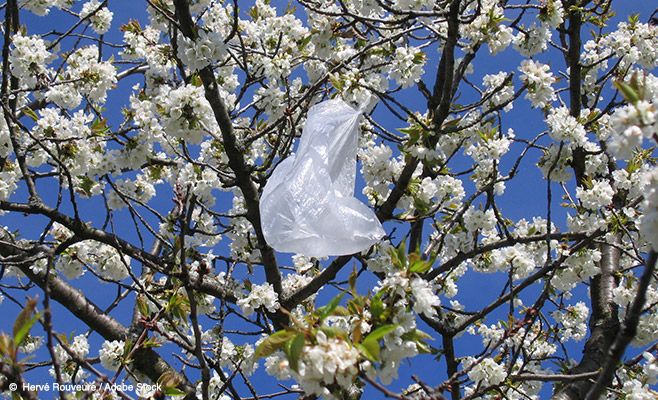
A robust recycling program is an essential component of zero waste, and so is eliminating unnecessary trash. Single-use disposable shopping bags (both paper and plastic) have a short life. On average, a typical plastic shopping bag is used for 12 minutes, then thrown away. Additionally, while plastic shopping bags are recyclable, on average only 2% of plastic bags are recycled annually.
We’ve all seen plastic bags floating on the highway and in trees. Working toward eliminating single-use shopping bags has several environmental benefits, including benefits to wastewater systems and protecting wildlife. While disposable shopping bags are seemingly ubiquitous, they have only been a part of our society for a short time. Getting back to shopping without disposable bags is the next step toward environmental sustainability and eliminating unnecessary waste.
In the workplace, eliminating single-use disposable bags at the point of distribution can save your business money. As seen in many grocery stores who offer incentives, it costs them less to reimburse customers than to provide single-use bags. If you offer disposable bags to your customers, consider that eliminating the use of single-use disposable bags will save you on both unnecessary shipping costs and wasted storage space.
So how do you wean your customers off those disposable crutches?
- Stop offering bags – make your customers request them
- Charge for bags – even a small fee can drastically change consumer behavior
- Place signage encouraging your customers to bring their bags
- Sell reusable bags at check-out, offering an alternative to your customers
- Reimburse those customers who bring their bags – this small gesture will cost you less than the bags and provide an incentive for your customers
- Place plastic bag recycling bins in your storefront – encouraging customers to recycle bags will provide an additional reminder that you are working to eliminate bags from the environment.
Achieving zero waste is a process and one that must be done with your customers and your employees. Educating your employees and customers on shifting away from the expectation that single-use bags are necessary is the key to eliminating unnecessary costs.




































































































































 Three Ways to Engage Teams and Clients to Maximize Your Recycling Program Engagement
Three Ways to Engage Teams and Clients to Maximize Your Recycling Program Engagement  How to Integrate Accessibility Into Your Sustainability Planning
How to Integrate Accessibility Into Your Sustainability Planning  Why Park Benches Can Promote Workplace Well-Being
Why Park Benches Can Promote Workplace Well-Being 
